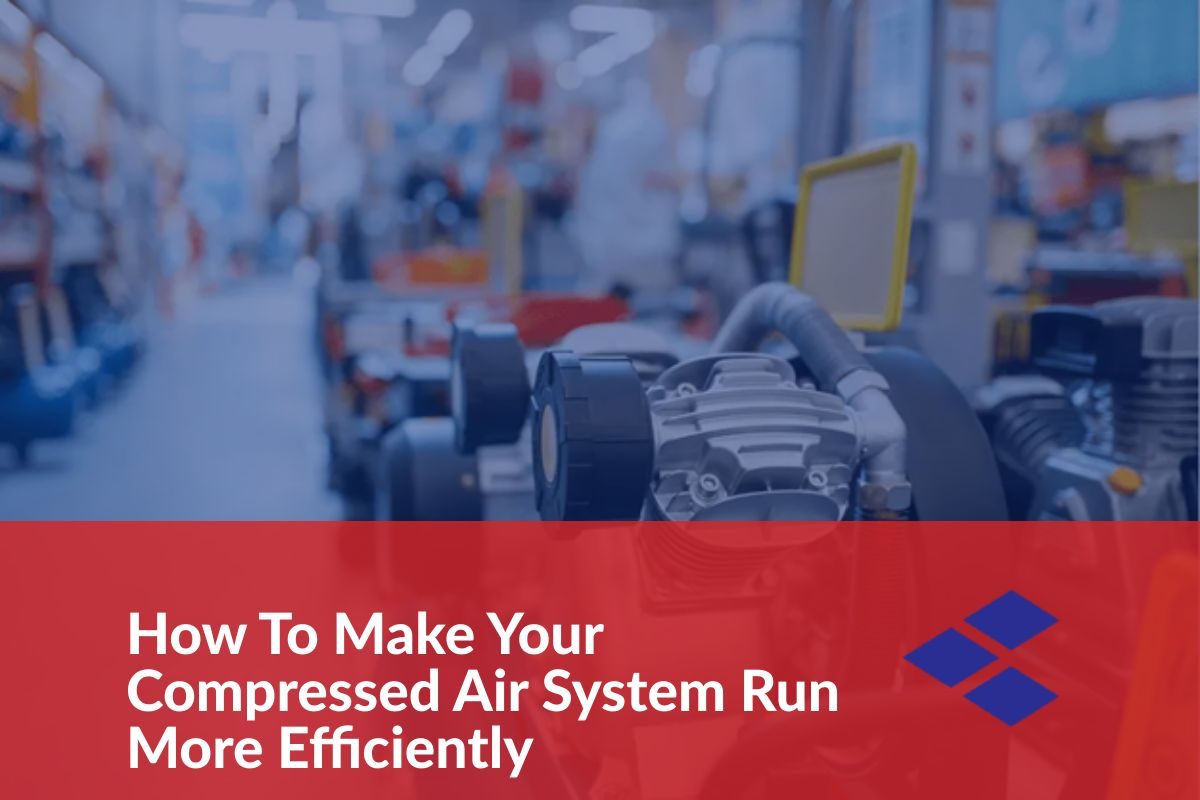
Keeping your machinery running properly is important for any successful business. Whether in a corporate setting surrounded by computers, printers, and other office equipment or in an industrial setting with generators, air compressors, and other large machines, keeping your tools in good working condition can make or break your entire operation.
Why is Compressed Air System Efficiency Important?
So, what is compressed air system efficiency, and why is the efficiency of your compressed air system important?
A compressed air system’s efficiency is its ability to operate at maximum potential while utilizing the least amount of energy possible. Upping your compressor’s efficiency results in the compressor requiring less energy to deliver the same quality results.
There are a multitude of reasons you want to increase the efficiency of your compressed air system. More efficient systems aid in increasing the productivity of your business and reducing the impact your application has on the environment.
A compressed air system running at peak efficiency helps your business save money while also conserving energy. High-efficiency systems also improve air quality, control pollution, and minimize the emissions of your operation.
Steps You Can Take to Increase Compressed Air System Efficiency
Now that you know why compressed air system efficiency is so important, here are a few steps you can take to increase the efficiency of your compressor.
- Perform regular compressed air system maintenance. While this may seem like an obvious answer, ensuring your compressed air system is properly maintained is one of the best ways to ensure system efficiency. Appropriate compressed air system maintenance keeps your system running smoothly and reliably. You can perform many procedures and inspections on your compressed air system to maintain productivity. These assessments should be done at varying intervals: daily, weekly, monthly, and annually. Speaking with a compressed air system professional, like those here at ESA, can help you develop a maintenance schedule that will work best for your application. Here are a few different types of evaluations to keep in mind:
- Checking oil levels
- Draining your system
- Changing air filters
- Tightening nuts and bolts
- Inspecting your system for damaged or broken parts
- Cleaning the intake valves and fuel tanks
- Check your compressed air system regularly for the presence of leaks. Undiagnosed air leaks within your compressed air system have the potential to cause a significant amount of energy loss. Over time, even the smallest leaks can lead to a considerable amount of air loss. Identifying and eliminating air leaks at the source easily prevents issues within your system.
- Minimize the pressure drop within your compressed air system. Pressure drop doesn’t only cause higher energy costs but also may lower the quality of your compressed air system’s overall performance. Reducing pressure drop allows your system to function more efficiently while providing your business with energy savings. There are several things you can do to prevent pressure drops from occurring, including:
- Reducing the distance that air must travel through your compressed air system.
- Replacing dirty filters regularly
- Minimizing moisture throughout your system
- Ensuring your system’s piping is the correct size
- Be aware of your air intake quality. Air quality has a huge impact on the efficiency of your compressed air system. Three main components of air quality are important to be mindful of.
- Humidity: Humid environments promote the buildup of moisture within your system and can lead to the development of rust. Dry environments are better suited for compressors and help prevent damage to metal parts.
- Temperature: Air at higher temperatures is much harder to compress than cold air, which requires less energy and encourages higher levels of air density within your compressor system.
- Composition: Air that contains dust, dirt, or other pollutants can cause wear and tear on even the best compressed air systems. Clean, contaminant-free air moves much more smoothly throughout compressors.
- Improve your system’s design. Improving the design of your compressed air system should always be a goal in increasing the efficiency of your production. There are many ways to improve the design of your compressed air system, including:
- Relocating your compressor if you notice conditions are not ideal.
- Using the smallest air compressor system possible to meet your needs.
- Investing in a storage tank to prevent pressure drops and conserve air pressure levels.
- Obtaining a heat recovery system.
- Straightening delivery lines.
Why Choose ESA?
At ESA, our trained technicians are dedicated to helping our customers by utilizing decades of knowledge in industrial compressed air system maintenance and repair. We are available 24/7 to answer your questions and address your concerns regarding your compressed air needs. Call us today for a consultation and to speak with a professional about increasing your compressed air system’s efficiency.
Arthur Pue
Arthur Pue is the President of Engineering Sales Associates. Connect with him on LinkedIn.
